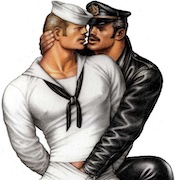- Adbot
-
ADBOT LOVES YOU
|

|
|
#
?
Jun 7, 2024 09:39
|
|
- Regarde Aduck
- Oct 19, 2012
-

c l o u d k i t t e n
-
Grimey Drawer
|
where the reindeers at
|
 #
?
Feb 19, 2023 08:09
#
?
Feb 19, 2023 08:09
|
|
- DancingShade
- Jul 26, 2007
-

by Fluffdaddy
|
The problem with the information age is it really does give every self important moron a voice and if so desired, a logo.
|
 #
?
Feb 19, 2023 08:09
#
?
Feb 19, 2023 08:09
|
|
- super sweet best pal
- Nov 18, 2009
-

|
$18 to piss off a bunch of racial purists? Sounds like a great deal.
|
 #
?
Feb 19, 2023 08:15
#
?
Feb 19, 2023 08:15
|
|
- Zodium
- Jun 19, 2004
-

|
Also to be fair, plenty of Russians and Westerners call both state and non-state officials controlling government entities and assets in Russia as oligarchs. I don't think it is correct but people keep yelling at me they need to privatize everything because "oligarchs already control it.” It is a "which one is it" situation.
a member of a national bourgeoisie that extracts surplus value from the working class in the country is a bad corrupt oligarch. a member of the western bourgeoisie that facilitates extracting surplus value for self organized Capital is a good free market billionaire.
|
 #
?
Feb 19, 2023 08:24
#
?
Feb 19, 2023 08:24
|
|
- evilmiera
- Dec 14, 2009
-

Status: Ravenously Rambunctious
|
I didn't know Square Enix was involved in this war
|
 #
?
Feb 19, 2023 08:29
#
?
Feb 19, 2023 08:29
|
|
- Regarde Aduck
- Oct 19, 2012
-

c l o u d k i t t e n
-
Grimey Drawer
|
Everyone fights, no one quits
|
 #
?
Feb 19, 2023 08:34
#
?
Feb 19, 2023 08:34
|
|
- Jel Shaker
- Apr 19, 2003
-

|
high gas prices have already caused severe harm among britains poorest people, it’s just a miracle that winter was so mild that we didn’t have mass deaths rather than lots of little ones
for example the current scandal is the energy companies forcing the poor to have prepayment meters installed, even if they’re vulnerable/old/have babies, because it’s a convenient workaround to just shutting them off rather than going to courts when the judge would almost certainly say wft, no, you’ll probably kill them
|
 #
?
Feb 19, 2023 08:40
#
?
Feb 19, 2023 08:40
|
|
- CODChimera
- Jan 29, 2009
-

|
God americans are such cucked peons lol their government has enough money to pay OTHER PEOPLES PENSIONS to keep them in a war while americans are literally incapable of paying health insurance, just unbelievable peasants.
yeah its messed up
|
 #
?
Feb 19, 2023 08:43
#
?
Feb 19, 2023 08:43
|
|
- genericnick
- Dec 26, 2012
-

|
Should book a flight and pack a gun in that case.
|
 #
?
Feb 19, 2023 09:39
#
?
Feb 19, 2023 09:39
|
|
- Palladium
- May 8, 2012
-

Very Good
✔️✔️✔️✔️
|
God americans are such cucked peons lol their government has enough money to pay OTHER PEOPLES PENSIONS to keep them in a war while americans are literally incapable of paying health insurance, just unbelievable peasants.
clinical case of terminal votebrains
|
 #
?
Feb 19, 2023 09:43
#
?
Feb 19, 2023 09:43
|
|
- fanfic insert
- Nov 4, 2009
-
|
Standing on the very edge of a cliff, looking to my right, not seeing anyone there loudly proclaiming "The far-right doesnt exist".
|
 #
?
Feb 19, 2023 10:29
#
?
Feb 19, 2023 10:29
|
|
- Majorian
- Jul 1, 2009
-

|
I didn't know Square Enix was involved in this war
After their NFT shenanigans they’re at war with all of mankind.
|
 #
?
Feb 19, 2023 10:31
#
?
Feb 19, 2023 10:31
|
|
- genericnick
- Dec 26, 2012
-

|
The good news is that one pipeline lives on. The last pipe can still be saved.
I wonder when the nations of Europe will realize it still exists.
The nations of Europe got pretty lucky with a mild winter and I don't think the one pipe that is still functional has enough capacity to replace the whole network that runs through Ukraine. Which might be relevant if Europe cuts Kiev loose.
I saw some reporting that the surviving pipeline is likely because the Biden administration’s delays or even the concept of the bombs remaining underwater for extended periods of time caused two of them to fail.
I wonder if they’ve been recovered, that would be interesting to know.
Seems hard to imagine that they wouldn't have been. Did we ever get anything more concrete on the new secrecy laws Sweden supposedly passed?
|
 #
?
Feb 19, 2023 10:41
#
?
Feb 19, 2023 10:41
|
|
- Vulin
- Jun 15, 2012
-

|
How is the US media squaring Hersh being wrong about Nord Stream with the german attorney general saying at the beginning of February that there are no signs of russian involvement in the attack on Nord Stream (and not saying anything about the involvement of other countries)?
Tried to google any stories, but couldn't find much about it in US mainstream media.
|
 #
?
Feb 19, 2023 10:58
#
?
Feb 19, 2023 10:58
|
|
- Doktor Avalanche
- Dec 30, 2008
-

|
How is the US media squaring Hersh being wrong about Nord Stream with the german attorney general saying at the beginning of February that there are no signs of russian involvement in the attack on Nord Stream (and not saying anything about the involvement of other countries)?
Tried to google any stories, but couldn't find much about it in US mainstream media.
they don't need to square anything because the people who read/watch them start from the premise that putler blew up the pipeline
|
 #
?
Feb 19, 2023 11:06
#
?
Feb 19, 2023 11:06
|
|
- super sweet best pal
- Nov 18, 2009
-

|
leet like jeff kaye
|
 #
?
Feb 19, 2023 11:21
#
?
Feb 19, 2023 11:21
|
|
- Phobos Anomaly
- Jul 23, 2018
-
|
IMF Story Part 3 - The Origins of Russian Economic Antagonism
This is an ongoing story of my attempt to clarify international development and how we’ve ended up creating highly polarized international situation today - in modern language, we call “developed” economies the Global North and the “developing” countries the Global South.
For Part 1 - What is the IMF? https://forums.somethingawful.com/showthread.php?noseen=1&threadid=3994250&pagenumber=3275&perpage=40#post526221526
For Part 2 - Creating an Internationally Competitive Economy https://forums.somethingawful.com/showthread.php?noseen=1&threadid=3994250&pagenumber=3296&perpage=40#post526255552
In 1945, as the Bretton Woods system (later to be institutionalized into organizations like the IMF and the World Bank) was being formulated and executed, it’s very little known here in the West that there was an appetite amongst the Roosevelt administration to include the USSR into the American-led economic bloc.
The war had been a massive productive catalyst to the US economy as production skyrocketed. Across the board, the Allies were dependent on American aid from its Lend-Lease program, which exported equipment and supplies on a credit basis. This credit basis was generally given on favorable terms, but the underlying ground was shifting - it was clear that America would eventually be the only country that could fund the rest of war-torn Europe in reconstruction.
This meant that the Bretton Woods system could be negotiated entirely in favor of Washington, but Roosevelt is playing a fine game here. Knowing that systems were going to be needed to help fund reconstruction, he envisioned both an “international” fund that could settle balance of payments (that is to say, imports and exports amongst countries) as well as a “reconstruction bank” that mainly provided loans with interest rates.
The Soviet Union was no different than the rest of Europe in desperately needing development money - but moreover, the Americans had a genuine affection for the Soviet Union in those early days. In the Soviet Union, the Americans saw a strong economic partner in which the development boom in the US could continue to fund the USSR’s devastation.
Similarly - in the USSR, there was an appetite and recognition of the strong need of both countries to integrate into the American-led Bretton Woods system of international development.
For clarity in technical definitions, the IMF is what’s known as a “monetary fund” and the World bank is the “long term credit fund”. The IMF’s role is to settle and balance of payments, which set currency valuations amongst nations. This is extremely important as creates boundaries on a what a country can import/export on a financial basis and it also sets domestic spending policy by pegging domestic currency against an internationally recognized "standard". The World Bank is a more “traditional” long term lender of credits, in which standard interest rates apply.
John Maynard Keynes was involved in the new Bretton Woods system, but since he was part of the British delegation that the Americans viewed as a peer-competitor, he often lamented at the “single currency” nature of how the Americans wanted to set up the new order. In his mind, having a single currency, the US dollar, become the reserve currency that would fund the reconstruction of Europe was ripe for eventually dominating the world. He proposed a “basket of currencies” based on individual countries that would act as an international currency that would limit this unipolar domination. As an aside, this is now exactly what BRICS is proposing.
The Russians knew that this was a possibility but like all of Europe, war-weariness and a need to get on with life was a pragmatic way to let the Americans have what they want - we’ll figure out the rest later.
So how exactly could a closed, Communist economy work within the context of a liberalized free-trade system? Surprisingly enough, it was thought that the Bretton Woods system would actually work better with the USSR as it didn’t have currency fluctuations and the central government provided nearly risk free transactions. Western exporters viewed these as technical advantages - they could rely on the government, rather than private capital, to pay on time and because the government had a monopoly on export prices, Western exporters could always expect what their profits could be.
As a foreign policy goal, the US also thought it was key to keep Russia in its camp - an international order with Russia not aligned will only bifurcate the world order. By giving Russia favorable long term credits, and developing the USSR as an ally, it would not only have a long term business partner, but would prevent the USSR from undermining the system with its own version of Bretton Woods.
What happened? Ultimately it was the inflexibility of the American system to allow for autonomy. While it’s true that the Russians wanted, and even desired an economic partnership with the US, it could not allow the total dominance of the US that would harm the domestic economy. A feature that the Soviets saw very early on in this system is the way in which this “free-trade” system would benefit American producers by forcing open domestic markets in Europe, A demand of the Americans to qualify to join the Bretton Woods system was to force European agriculture to switch its products grain to dairy and vegetables, allowing American producers to sell grain and ultimately keep Europe import dependent.
Import dependency would then transfer into political power, as now the Americans would have leverage over the internal politics of a country. In order words: “[we] did not fight the deadliest war in history in order to make the world safe for British merchants and American exporters. This is perhaps one of the basic reasons why [we] refused the American invitation to participate in the projected International Conference on Trade and Employment.”
Said another way - we let the Americans go into a war-torn country, and they export their cheap goods into it - what would remain of its industry? There would be none. This fear of letting America being able to dictate the economic and political autonomy would cause alarm amongst Soviet leaders, but it is entirely justified - the Americans themselves set up the system in order for them to be able to do just that.
It’s other allies, such as Britain and France, did not have the capacity to fight against this and it eventually led to the collapse of the British Empire at the American’s insistence of allowing it’s Sterling Area to be opened up to American exporters - now, Americans could sell its goods to huge markets like India and could easily undercut British prices due to it’s vastly superior manufacturing base. The final blow to Britain was by forcing the British to own the war debt that it placed on its colonies - it could no longer impoverish India and would instead take on all of the war debt that it owed the United States. This war debt was only paid off in 2006.
By containing it’s allies, America used it’s economic leverage to keep them subservient to American power which lasts to this day. Consequently, by trying to economically isolate the Soviet Union after it balked, it brought about the drive for Soviet planners to gain self-sufficiency. These nationalistic economic policy aims of the United States that won out, and it’s one-sided nature on who the winner would be, would prove to split the world down the middle for a near century.
China owns.
|
 #
?
Feb 19, 2023 11:56
#
?
Feb 19, 2023 11:56
|
|
- Jel Shaker
- Apr 19, 2003
-

|
it would be interesting to see how in an alternative universe a “russia friendly” nato would have destroyed much of the former ussrs farming and productive capacity, for example right now russia is still a massive grain exporter which is severely limiting the effectiveness of sanctions
|
 #
?
Feb 19, 2023 12:00
#
?
Feb 19, 2023 12:00
|
|
- Zodium
- Jun 19, 2004
-

|
IMF Story Part 3 - The Origins of Russian Economic Antagonism
This is an ongoing story of my attempt to clarify international development and how we’ve ended up creating highly polarized international situation today - in modern language, we call “developed” economies the Global North and the “developing” countries the Global South.
For Part 1 - What is the IMF? https://forums.somethingawful.com/showthread.php?noseen=1&threadid=3994250&pagenumber=3275&perpage=40#post526221526
For Part 2 - Creating an Internationally Competitive Economy https://forums.somethingawful.com/showthread.php?noseen=1&threadid=3994250&pagenumber=3296&perpage=40#post526255552
In 1945, as the Bretton Woods system (later to be institutionalized into organizations like the IMF and the World Bank) was being formulated and executed, it’s very little known here in the West that there was an appetite amongst the Roosevelt administration to include the USSR into the American-led economic bloc.
The war had been a massive productive catalyst to the US economy as production skyrocketed. Across the board, the Allies were dependent on American aid from its Lend-Lease program, which exported equipment and supplies on a credit basis. This credit basis was generally given on favorable terms, but the underlying ground was shifting - it was clear that America would eventually be the only country that could fund the rest of war-torn Europe in reconstruction.
This meant that the Bretton Woods system could be negotiated entirely in favor of Washington, but Roosevelt is playing a fine game here. Knowing that systems were going to be needed to help fund reconstruction, he envisioned both an “international” fund that could settle balance of payments (that is to say, imports and exports amongst countries) as well as a “reconstruction bank” that mainly provided loans with interest rates.
The Soviet Union was no different than the rest of Europe in desperately needing development money - but moreover, the Americans had a genuine affection for the Soviet Union in those early days. In the Soviet Union, the Americans saw a strong economic partner in which the development boom in the US could continue to fund the USSR’s devastation.
Similarly - in the USSR, there was an appetite and recognition of the strong need of both countries to integrate into the American-led Bretton Woods system of international development.
For clarity in technical definitions, the IMF is what’s known as a “monetary fund” and the World bank is the “long term credit fund”. The IMF’s role is to settle and balance of payments, which set currency valuations amongst nations. This is extremely important as creates boundaries on a what a country can import/export on a financial basis and it also sets domestic spending policy by pegging domestic currency against an internationally recognized "standard". The World Bank is a more “traditional” long term lender of credits, in which standard interest rates apply.
John Maynard Keynes was involved in the new Bretton Woods system, but since he was part of the British delegation that the Americans viewed as a peer-competitor, he often lamented at the “single currency” nature of how the Americans wanted to set up the new order. In his mind, having a single currency, the US dollar, become the reserve currency that would fund the reconstruction of Europe was ripe for eventually dominating the world. He proposed a “basket of currencies” based on individual countries that would act as an international currency that would limit this unipolar domination. As an aside, this is now exactly what BRICS is proposing.
The Russians knew that this was a possibility but like all of Europe, war-weariness and a need to get on with life was a pragmatic way to let the Americans have what they want - we’ll figure out the rest later.
So how exactly could a closed, Communist economy work within the context of a liberalized free-trade system? Surprisingly enough, it was thought that the Bretton Woods system would actually work better with the USSR as it didn’t have currency fluctuations and the central government provided nearly risk free transactions. Western exporters viewed these as technical advantages - they could rely on the government, rather than private capital, to pay on time and because the government had a monopoly on export prices, Western exporters could always expect what their profits could be.
As a foreign policy goal, the US also thought it was key to keep Russia in its camp - an international order with Russia not aligned will only bifurcate the world order. By giving Russia favorable long term credits, and developing the USSR as an ally, it would not only have a long term business partner, but would prevent the USSR from undermining the system with its own version of Bretton Woods.
What happened? Ultimately it was the inflexibility of the American system to allow for autonomy. While it’s true that the Russians wanted, and even desired an economic partnership with the US, it could not allow the total dominance of the US that would harm the domestic economy. A feature that the Soviets saw very early on in this system is the way in which this “free-trade” system would benefit American producers by forcing open domestic markets in Europe, A demand of the Americans to qualify to join the Bretton Woods system was to force European agriculture to switch its products grain to dairy and vegetables, allowing American producers to sell grain and ultimately keep Europe import dependent.
Import dependency would then transfer into political power, as now the Americans would have leverage over the internal politics of a country. In order words: “[we] did not fight the deadliest war in history in order to make the world safe for British merchants and American exporters. This is perhaps one of the basic reasons why [we] refused the American invitation to participate in the projected International Conference on Trade and Employment.”
Said another way - we let the Americans go into a war-torn country, and they export their cheap goods into it - what would remain of its industry? There would be none. This fear of letting America being able to dictate the economic and political autonomy would cause alarm amongst Soviet leaders, but it is entirely justified - the Americans themselves set up the system in order for them to be able to do just that.
It’s other allies, such as Britain and France, did not have the capacity to fight against this and it eventually led to the collapse of the British Empire at the American’s insistence of allowing it’s Sterling Area to be opened up to American exporters - now, Americans could sell its goods to huge markets like India and could easily undercut British prices due to it’s vastly superior manufacturing base. The final blow to Britain was by forcing the British to own the war debt that it placed on its colonies - it could no longer impoverish India and would instead take on all of the war debt that it owed the United States. This war debt was only paid off in 2006.
By containing it’s allies, America used it’s economic leverage to keep them subservient to American power which lasts to this day. Consequently, by trying to economically isolate the Soviet Union after it balked, it brought about the drive for Soviet planners to gain self-sufficiency. These nationalistic economic policy aims of the United States that won out, and it’s one-sided nature on who the winner would be, would prove to split the world down the middle for a near century.
forgot to quote this, thanks. 
|
 #
?
Feb 19, 2023 12:03
#
?
Feb 19, 2023 12:03
|
|
- Ardennes
- May 12, 2002
-

|
it would be interesting to see how in an alternative universe a “russia friendly” nato would have destroyed much of the former ussrs farming and productive capacity, for example right now russia is still a massive grain exporter which is severely limiting the effectiveness of sanctions
Admittedly, if the USSR actually had joined the IMF and GAAT, eventually it would be been used against it as the Paris Club and the IMF turned against Romania and Poland. The problem with the Soviet Union was weakness in the upper ranks of the Communist Party itself and that a "Westernizing" faction (ie revisionists) were willing to bend over backwards to appease an enemy that wanted the complete destruction of the Soviet state and the destitution of its populace. Admittedly, you could argue that the Soviets were eventually going to lose just base on the economic disparity between the first and second worlds but the Westernizers made things considerably worse.
------
Also, map watchers are making a big deal about a breakthrough by Russian forces NW of Bakhmut that is threatening the last road out of the town (they are saying 3-4km away). If it is real, I would expect at least some type of reaction by the Ukrainians even if it is through open country.
|
 #
?
Feb 19, 2023 12:09
#
?
Feb 19, 2023 12:09
|
|
- fanfic insert
- Nov 4, 2009
-
|
IMF Story Part 3 - The Origins of Russian Economic Antagonism
great post
If you(or anyone else) can, please do a post about how the post ww2 soviet occupied territories became what they did
I vaguely remember reading some about how the USSR wanted to establish something akin to the EU to deal with it but due to the split youre describing instead just turned them over wholesale to the various communist parties
|
 #
?
Feb 19, 2023 12:29
#
?
Feb 19, 2023 12:29
|
|
- John Charity Spring
- Nov 4, 2009
-

SCREEEEE
|
great post
If you(or anyone else) can, please do a post about how the post ww2 soviet occupied territories became what they did
I vaguely remember reading some about how the USSR wanted to establish something akin to the EU to deal with it but due to the split youre describing instead just turned them over wholesale to the various communist parties
I'm not the person to do an effort post about it but I do know that with Germany specifically the USSR wanted a unified, neutral Germany not aligned to either the capitalist or the socialist bloc, but the USA completely refused to countenance this and pushed for the split and all that entailed, re-arming West Germany and re-empowering former nazis etc. Honestly I don't pretend to know if a neutral Germany would have been a good idea but I do think that the Soviets were approaching the post-war settlement in 'better faith' than the western Allies were, which kind of comes across as naivety in hindsight. Stalin seemed convinced that they could stick to spheres of influence for the foreseeable future, hence letting places like Greece have their popular communist movements get crushed with the expectation that they wouldn't get their own sphere messed with, and not raising a stink about Italy's post-war elections being basically rigged by the US. Which obviously didn't last even a few years past the end of WW2.
You can kind of see the same thing in how the USSR dealt with Korea, it comes across as giving the USA too much rope.
|
 #
?
Feb 19, 2023 12:45
#
?
Feb 19, 2023 12:45
|
|
- Ardennes
- May 12, 2002
-

|
I'm not the person to do an effort post about it but I do know that with Germany specifically the USSR wanted a unified, neutral Germany not aligned to either the capitalist or the socialist bloc, but the USA completely refused to countenance this and pushed for the split and all that entailed, re-arming West Germany and re-empowering former nazis etc. Honestly I don't pretend to know if a neutral Germany would have been a good idea but I do think that the Soviets were approaching the post-war settlement in 'better faith' than the western Allies were, which kind of comes across as naivety in hindsight. Stalin seemed convinced that they could stick to spheres of influence for the foreseeable future, hence letting places like Greece have their popular communist movements get crushed with the expectation that they wouldn't get their own sphere messed with. Which obviously didn't last even a few years past the end of WW2.
Arguably, ironically enough, the problem the Soviet's geopolitical mindset was defensive and they were hoping for a post-war settlement that would neutralize Germany as a threat while recreating buffer states around them. It is part of the reason why they agreed to a neutral Austria. The problem is they were facing a power (the United States) that was only interested in dismemberment not peaceful co-existence and the leadership of the Communist Party never fully embraced this reality. Part of this fantasy was rooted in war-time cooperation and the relatively honest way Roosevelt had handled Soviet-US relations. Obviously, this is a mistake the Soviet Union then the Russian Federation would continually make to today.
|
 #
?
Feb 19, 2023 12:52
#
?
Feb 19, 2023 12:52
|
|
- crepeface
- Nov 5, 2004
-

r*p*f*c*
|
2016 interview with hersh. he talks about syria, russia and bernie/hillary/trump a bit.
quote:Tariq Ali talks to investigative journalist, Seymour Hersh, about his revelations concerning the chemical attack at Ghouta, Syria in August 2013.
https://www.youtube.com/watch?v=FTeZitRDhk0
|
 #
?
Feb 19, 2023 14:02
#
?
Feb 19, 2023 14:02
|
|
- Buffer
- May 6, 2007
-
I sometimes turn down sex and blowjobs from my girlfriend because I'm too busy posting in D&D. PS: She used my credit card to pay for this.
|
With a friend like America, who needs enemies?
|
 #
?
Feb 19, 2023 14:17
#
?
Feb 19, 2023 14:17
|
|
- Pistol_Pete
- Sep 15, 2007
-

-
Oven Wrangler
|
https://www.theguardian.com/world/2023/feb/19/ukraine-war-over-unless-eu-boosts-military-support-says-top-diplomat
quote:
The war with Ukraine will be over unless the EU finds a way in weeks to speed up the provision of ammunition to Ukraine, Josep Borrell, the EU foreign affairs chief, warned on the final day of the Munich security conference.
He said a special meeting of EU defence ministers slated for 8-9 March will provide a chance for countries to offer ammunition from their existing stocks, adding it is taking up to 10 months for European armies to order and receive a single bullet.
“We are in urgent war mode,” he said. “This shortage of ammunition has to be solved quickly; it is a matter of weeks.” He said if it was not the war would be over.
...
Kallas, speaking at the same event, said Russia was in a wartime mode, producing ammunition across three shifts, adding there needed to be a similar war footing in Europe. She claimed defence industry executives had told her they had no orders from the EU.
Borrell said the absence of ammunition was because “we forgot about classical wars – we were only engaged with expeditionary forces and technological Blitzkrieg.”
This backs up what I've said before about this war: the West willing the ends, but not the means. It's interesting that a crisis is predicted within weeks, not months or years.
|
 #
?
Feb 19, 2023 14:32
#
?
Feb 19, 2023 14:32
|
|
- crepeface
- Nov 5, 2004
-

r*p*f*c*
|
lol we're at the point of trailers for prank calls
https://twitter.com/TaranQ/status/1626958457696911360?s=20
|
 #
?
Feb 19, 2023 14:39
#
?
Feb 19, 2023 14:39
|
|
- Dixon Chisholm
- Jan 2, 2020
-

|
Agreed. I'm personally very worried about this growing trend of so-called "leftists" supporting the confederacy...
any war against yankee scum is a good war.
|
 #
?
Feb 19, 2023 14:42
#
?
Feb 19, 2023 14:42
|
|
- lollontee
- Nov 4, 2014
-

Can't post for 10 years!
|
The US bombed the pipeline to show they could bomb European heads of government if they wanted to.
it is a direct message of "you are our vassals, we can gently caress with you in any way we want, and you're going to take it in the rear end with a smile". just an absolute dick move to remind europe who did win the last war, and whats to come
|
 #
?
Feb 19, 2023 15:12
#
?
Feb 19, 2023 15:12
|
|
- Delta-Wye
- Sep 29, 2005
-

|
No need to pay pensions if you just conscript them all.
(taps side of nose)
No legs? No problem. You can still sit in chair, now just sitting in trench also.
edit - The sooner Ukraine conscripts everyone with a pulse that isn't in uniform yet to fill those trenches, women, children, elderly and especially the elderly women caring for the orphan children, the sooner victory is assured!
i saw a video of prigozhin informing a room of amputee wagnerites in that just because they were missing limbs doesn't mean they aren't still on contract
lmao, go get em rollies
edit:
https://twitter.com/nexta_tv/status/1579180884108128256
lol
Delta-Wye has issued a correction as of 15:41 on Feb 19, 2023
|
 #
?
Feb 19, 2023 15:36
#
?
Feb 19, 2023 15:36
|
|
- Adbot
-
ADBOT LOVES YOU
|

|
|
#
?
Jun 7, 2024 09:39
|
|
- Orange Devil
- Oct 1, 2010
-

Wullie's reign cannae smother the flames o' equality!
|
Never trust an American is a wise motto to live by tbh.
|
 #
?
Feb 19, 2023 15:47
#
?
Feb 19, 2023 15:47
|
|





































